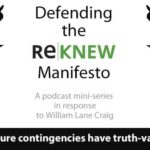We run our website the way we wished the whole internet worked: we provide high quality original content with no ads. We are funded solely by your direct support. Please consider supporting this project.

Free Will: The origin of evil
In this continuing series on free will, Greg discusses how evil can only be accounted for if we acknowledge free will. This is especially true if you believe that God is good.
Category: Q&A
Tags: Calvinism, Determinism, Evil, Free Will, Open Theism, Problem of Evil
Topics: Free Will and the Future, Providence, Predestination and Free Will
Related Reading

Lighten Up: Oh my… I am so very very scared…
Well, my dear friend Frankie V. once again has a bad case of verbal diarrhea (explains his breath lately), running off about how he’s going to smack me down in our “all-out, no holds barred, ring-side seat, verbal wrestling match” on the open view of the future. I’m supposed to shutter in my boots at…

Lord Willing? Part 1
Greg sat down with Jessica Kelley recently to talk with her about her book Lord Willing?. We’re posting their conversation in three parts. Today, in part 1, Jessica shares the story of when her son Henry was diagnosed with an aggressive brain tumor at age 4. You can find part 2 of the interview here, and part…

Divine Wisdom
Why doesn’t God end it all and stop the slaughter? Why does God allow suffering and evil to go on so long? Here, Greg offers two possible answers to these questions. Option A is that all evil somehow is designed by God and somehow brings glory to him. But Greg thinks Option B is a better explanation, and it involves…

The Risk of Love
The most basic and yet most profound teaching of the Bible is that “God is love” (1 Jn 4:8; 16). He is revealed to be a God who is triune—Father, Son and Holy Spirit (See Mt 3:16; 28:19, Jn 14:26; 15:26)—who’s very essence is an eternal, loving relationship. He created the world out of love…

Podcast: Defending the Manifesto (6 of 10)
Greg responds to challenges by William Lane Craig from Craig’s podcast “Reasonable Faith.“ Greg denies Molinism and discusses the logic of possibility. http://traffic.libsyn.com/askgregboyd/Episode_0061.mp3

Does God Intervene?
The Open View of the future recognizes the vast influence of all the angelic and human wills God created, which, in turn, influences the various outcomes and circumstances in life. Therefore life is arbitrary because of the way the decisions made by an unfathomably vast multitude of free agents intersect with each other. How life…
